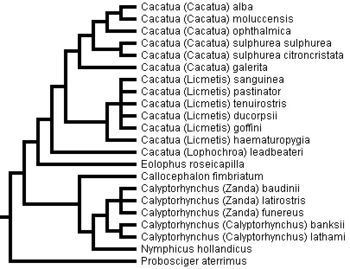Cacatuidae (Cockatoos): Difference between revisions
imported>Kim van der Linde (→Subdivision: another official name and a updated scientific name) |
mNo edit summary |
||
| (3 intermediate revisions by 2 users not shown) | |||
| Line 8: | Line 8: | ||
| ordo = [[Psittaciformes]] | | ordo = [[Psittaciformes]] | ||
| familia = '''Cacatuidae''' | | familia = '''Cacatuidae''' | ||
| familia_authority = [[George Robert Gray|GR Gray]], | | familia_authority = [[George Robert Gray|GR Gray]], 1840 | ||
| subdivision_ranks = Subfamily | | subdivision_ranks = Subfamily | ||
| subdivision = | | subdivision = | ||
| Line 20: | Line 20: | ||
==Subdivision== | ==Subdivision== | ||
{{Image|Cockatoo phylogeny.jpg|right|350px|Cockotoo phylogeny.<ref>Brown, D.M. & Toft, C.A. (1999): Molecular systematics and biogeography of the cockatoos (Psittaciformes: Cacatuidae). Auk 116(1): 141-157.</ref> {{Cockatoo phylogeny.jpg/credit}}}} | |||
* '''Subfamily [[Microglossinae]]''' | * '''Subfamily [[Microglossinae]]''' | ||
** Genus ''[[Probosciger]]'' | ** Genus ''[[Probosciger]]'' | ||
| Line 60: | Line 60: | ||
<div class="references-small"> | <div class="references-small"> | ||
<references /> | <references /> | ||
</div> | </div>[[Category:Suggestion Bot Tag]] | ||
Latest revision as of 16:00, 23 July 2024
| Cockatoos | ||||||||||
|---|---|---|---|---|---|---|---|---|---|---|
| Scientific classification | ||||||||||
| ||||||||||
| Subfamily | ||||||||||
The Cacatuidae (Cockatoo family) is one of the two families in the order Psittaciformes and consists of 21 species, mainly found in Australia, Indonesia, New Guinea and other nearby islands. Cockatoos share characteristics such as the curved beak and the zygodactyl foot, with two forward toes and two backwards toes. The absence of the Dyck texture feather composition results in that the basic color of most cockatoos is white, gray or black. Many species have spots of red or yellow in their plumage, but blue and green are strikingly absent. A direct obvious characteristic that differentiate them from the parrots is the movable headcrest, which can be very large and colorful. Other differentiating traits include several anatomical traits, including the the presence of a gall blather.
Subdivision
- Subfamily Microglossinae
- Genus Probosciger
- Probosciger aterrimus (Palm Cockatoo)
- Genus Probosciger
- Subfamily Calyptorhynchinae - dark cockatoos
- Genus Callocephalon
- Callocephalon fimbriatum (Gang-gang Cockatoo)
- Genus Nymphicus
- Nymphicus hollandicus (Cockatiel)
- Genus Calyptorhynchus
- Subgenus Calyptorhynchus - black-and-red cockatoos
- Calyptorhynchus (Calyptorhynchus) banksii (Red-tailed Black Cockatoo)
- Calyptorhynchus (Calyptorhynchus) lathami (Glossy Black Cockatoo)
- Subgenus Zanda - black-and-yellow/white cockatoos
- Calyptorhynchus (Zanda) funereus (Yellow-tailed Black Cockatoo)
- Calyptorhynchus (Zanda) latirostris (Short-billed Black Cockatoo)
- Calyptorhynchus (Zanda) baudinii (Long-billed Black Cockatoo)
- Subgenus Calyptorhynchus - black-and-red cockatoos
- Genus Callocephalon
- Subfamily Cacatuinae - white cockatoos
- Genus Eolophus
- Eolophus roseicapilla (Galah)
- Genus Lophocroa
- Lophocroa leadbeateri (Major Mitchell's Cockatoo)
- Genus Cacatua
- Subgenus Cacatua - true white cockatoos
- Cacatua (Cacatua) galerita (Sulphur-crested Cockatoo)
- Cacatua (Cacatua) sulphurea (Yellow-crested Cockatoo)
- Cacatua (Cacatua) ophthalmica (Blue-eyed Cockatoo)
- Cacatua (Cacatua) moluccensis (Salmon-crested Cockatoo)
- Cacatua (Cacatua) alba (Umbrella Cockatoo)
- Subgenus Licmetis - corellas
- Cacatua (Licmetis) tenuirostris (Long-billed Corella)
- Cacatua (Licmetis) pastinator (Western Corella)
- Cacatua (Licmetis) sanguinea (Little Corella)
- Cacatua (Licmetis) haematuropygia (Red-vented Cockatoo)
- Cacatua (Licmetis) goffiniana (Tanimbar Cockatoo)
- Cacatua (Licmetis) ducorpsii (Ducorps' Cockatoo)
- Subgenus Cacatua - true white cockatoos
- Genus Eolophus
References
- ↑ Brown, D.M. & Toft, C.A. (1999): Molecular systematics and biogeography of the cockatoos (Psittaciformes: Cacatuidae). Auk 116(1): 141-157.
